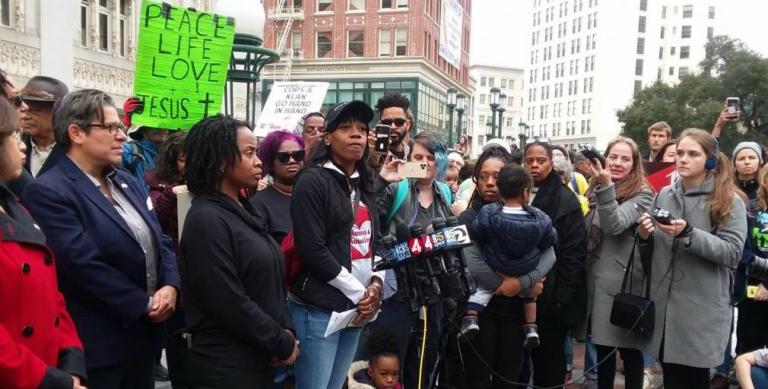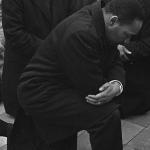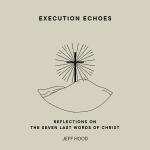
So what is sin? I tend to define it as any human behavior that contradicts God’s purpose of establishing perfect harmony and belonging throughout his creation (which is how I would define the biblical concept of shalom). Sin can be individual or collective. It can be intentional or the result of negligence. It’s rarely the case that sin happens in a way where blame is clear-cut and easy to assign. It’s usually a spider web of complicated personalities and social forces interacting in ways that can be justified but result in harm and further sin.
Many Christians define sin straightforwardly as breaking the rules, especially breaking a rule that is explicitly laid forth in scripture. The problem with this definition is that the choices we make in life usually involve deciding between different sets of rules, even between different rules that we find in scriptures. When we break one rule, it’s almost always because we’re following another rule that seems to trump it.
How would a rule-following German Christian in the early twentieth century resist the Holocaust? Often breaking rules that are unjust and harmful to humanity require trumping them with rules that seem soft, abstract, and unenforceable, like “love your neighbor as yourself.” What Jesus calls “the weightier matters of the law: justice and mercy and faith” seem open to myriad possible interpretation, which means they can be cast aside for less costly, more straightforward rules, like commands to “tithe mint, dill, and cumin” (Matthew 23:23).
For the apostle Paul, sin is not so much a transgression against a rule as it is a master rule-maker whose rules contradict God’s plan to establish a harmonious, loving world where everyone belongs. In Romans 6, Paul says that the greatest gift of God’s grace is that we no longer have to be “slaves of sin,” which is to say that we no longer have to follow the rules that sin gives us. Instead we can be obedient to the love that inspires us to live with a mercy that breaks all the rules imposed by a sin-saturated world.
In our age, the most ubiquitous rule-maker that exists is the market. The market gives us rules about every aspect of our behavior. Many of the college students on the campuses where I work are thoroughly obedient to the laws of the market. They know the rules of the ironic banter that regulate their speech, their jokes, and under what circumstances they are allowed to be “extra.” They know the rules for fashion combinations they are allowed to wear to class and under what circumstances they can get away with sweatpants. They know what chemicals they are expected to put in their bodies every weekend. They know the rules for how they are supposed to interact with strangers they’ve slept with when they see them on the sidewalk the week after.
All the things college students do that cause the older generations to gasp are simply following rules that govern a different social propriety. It is simply not accurate to see college students as rebelling against the social rules of prior generations so much as they are obeying a different set of social rules that have been imposed on them by advertising, social media trends, and peer pressure. The college students who rebel against the rules are the ones who do things like go to art galleries on a weekend evening instead of the fraternity keg party.
My youngest son thinks it’s a rule that he has to finish whatever game he starts on the X-Box. This rule trumps the rule that when Dad tells you to stop, you stop right away. It’s not so much that he’s rebelling against my authority, but that he truly believes something about the universe will be violated if he stops before the end of the game. In some cases, this actually does involve betraying his “team” of fellow players on the Internet, as he’s explained to me.
I used to think it was a rule that I had to consume two large glasses of wine (and sometimes a fair bit more) in order to effectively write a blog post. The wine was supposedly a necessary tool to help me relax. Nothing in the Bible told me that I couldn’t or shouldn’t do this (or at least whatever the Bible had to say could be easily rationalized away). But on March 16, 2016, a voice said to me, “You really don’t have to drink,” and I accepted the invitation and have been sober ever since.
Many of the problematic rules I’ve described so far are relatively innocuous, though addictive, compulsive behavior is certainly the root of all sorts of other harm. But what about the rules of the market that aren’t just social norms that compel obedience but the structural boundaries of our economic system and our sense of what’s even possible in the “real world”?
What about the rule that says whatever profit I make as a stockholder in a company that cheats its workers is my money, fair and square, and those workers who have been cheated have no recourse against me even if my profit was taken directly out of their pockets?
What about the rule that says homeless women are trespassing when they take over a house that is a vacant investment property in a city full of vacant investment properties instead of saying that real estate companies are stealing valuable land and shelter from cities whose taxpaying, voting residents are being squeezed out into the streets?
The homeless mothers squatting the property in Oakland were arrested and violently removed from the home (thankfully they’ve since been able to negotiate an opportunity to buy the property). Wedgewood Properties, which owns the house, is a national home-flipping conglomerate, which buys thousands of foreclosed and other properties for cheap, repaints them, raises the price dramatically, and lets them sit until somebody can afford them. One of the homeless moms said there are four times as many vacant properties in Oakland as there are homeless people.
In biblical Israel, the existence of empty investment properties amidst a shortage of affordable housing would be understood as a mockery of God even if there wasn’t a specific Torah commandment about affordable housing. The prophet Isaiah says, “Woe to you who add house to house and join field to field till no space is left and you live alone in the land” (Isaiah 5:8). But that verse is not a “Thou shalt not.” So it presumably doesn’t have any authority to the type of Christian who talks about “biblical authority” but believes that the laws of the market are “just the way things are,” and the Bible has nothing to say about them.
So who is the sinner in the case of these homeless women? It might be easy for a “biblical” Christian to conclude straightforwardly the sinner is the one who trespasses and uses someone else’s private property, even if that property belongs to an anonymous real estate company that has thousands of vacant investment properties. In this view, homelessness and poverty are unfortunate circumstances at best and a result of presumably irresponsible, immoral living at worst. The idea that there’s any semblance of collective moral responsibility for the survival of individual citizens is understood to be secular socialist nonsense.
To me, this mindset actually illustrates the entrenched power of sin that the apostle Paul wrote about. Our greedy, sin-soaked market creates rules that establish “just the way things are” and our society’s wealthy investors and homeowners go about their lives without an inkling of conflict in their consciences. Sin is deadly when it tells us that we can’t live any differently because it’s too complicated and it’s not our fault anyway.
To my understanding, that is precisely the state of moral suffocation that the apostle Paul believes we must be liberated from. As much as we want the rules the market gives us about private property to be categorically morally distinct from the rules the market gives us about casual sex and alcohol consumption, they are all intertwined together in the same mass-engineered reality called capitalism. Being liberated from sin means to be liberated from obedience to “the way things are.”
This isn’t to say that having a free market is innately evil. There are certainly worse ways to organize an economy. We just need to be vigilant and aware of the ways that rules are constantly being imposed on us by forces other than God that define the boundaries of what we think is possible. It’s easy for many “biblical” Christians to bracket off economic activity as being outside the purview of moral analysis (even though there are many very explicit teachings in the Bible concerning how resources are distributed and how poor people are treated).
If our duty as Christians is not merely to secure a happy afterlife for ourselves and people we evangelize, but to work for a world in which God’s desire for harmony and belonging is manifested fully (a.k.a. living in the kingdom of God), then we need to be involved in challenging and breaking the rules of the market that hurt people. This may include squatting a house or supporting people who do, even though trespassing is still wrong in many circumstances.
Sin is not primarily rebellion against rules. Sin is primarily obedience to rules that defy God’s love. It’s somewhat arbitrary for me to say that, because rebellion to one thing is always obedience to another. But I think it’s more productive to think of sin as an impostor rule-maker that stands in the place of God and against which God has to lead a revolt through Jesus.
There are plenty of laws and rules in our world that are good and valid; there are also laws and rules (written and unwritten) that straightjacket us into thinking the world cannot be a place of perfect harmony and belonging. I really think the rules that suffocate our imagination are the sin that Jesus died on the cross to liberate us from, whether they manifest themselves in traditionally understood immorality or the selfishness the world tells us is respectable.
















